Unit5Music教案
Unit5Music全单元教学设计(新课标版高一英语必修二教案教学设计)
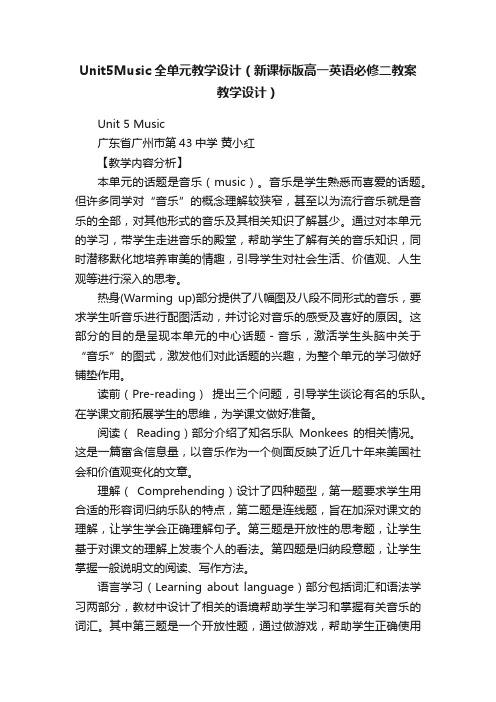
Unit5Music全单元教学设计(新课标版高一英语必修二教案教学设计)Unit 5 Music广东省广州市第43中学黄小红【教学内容分析】本单元的话题是音乐(music)。
音乐是学生熟悉而喜爱的话题。
但许多同学对“音乐”的概念理解较狭窄,甚至以为流行音乐就是音乐的全部,对其他形式的音乐及其相关知识了解甚少。
通过对本单元的学习,带学生走进音乐的殿堂,帮助学生了解有关的音乐知识,同时潜移默化地培养审美的情趣,引导学生对社会生活、价值观、人生观等进行深入的思考。
热身(Warming up)部分提供了八幅图及八段不同形式的音乐,要求学生听音乐进行配图活动,并讨论对音乐的感受及喜好的原因。
这部分的目的是呈现本单元的中心话题-音乐,激活学生头脑中关于“音乐”的图式,激发他们对此话题的兴趣,为整个单元的学习做好铺垫作用。
读前(Pre-reading)提出三个问题,引导学生谈论有名的乐队。
在学课文前拓展学生的思维,为学课文做好准备。
阅读(Reading)部分介绍了知名乐队Monkees 的相关情况。
这是一篇富含信息量,以音乐作为一个侧面反映了近几十年来美国社会和价值观变化的文章。
理解(Comprehending)设计了四种题型,第一题要求学生用合适的形容词归纳乐队的特点,第二题是连线题,旨在加深对课文的理解,让学生学会正确理解句子。
第三题是开放性的思考题,让学生基于对课文的理解上发表个人的看法。
第四题是归纳段意题,让学生掌握一般说明文的阅读、写作方法。
语言学习(Learning about language)部分包括词汇和语法学习两部分,教材中设计了相关的语境帮助学生学习和掌握有关音乐的词汇。
其中第三题是一个开放性题,通过做游戏,帮助学生正确使用短语dream of与to be honest with。
语法部分主要是引导、启发学生结合阅读内容,去发现、归纳、感悟目标语言结构――介词+which(whom)引导的定语从句。
高一英语下册unit 5 music教案
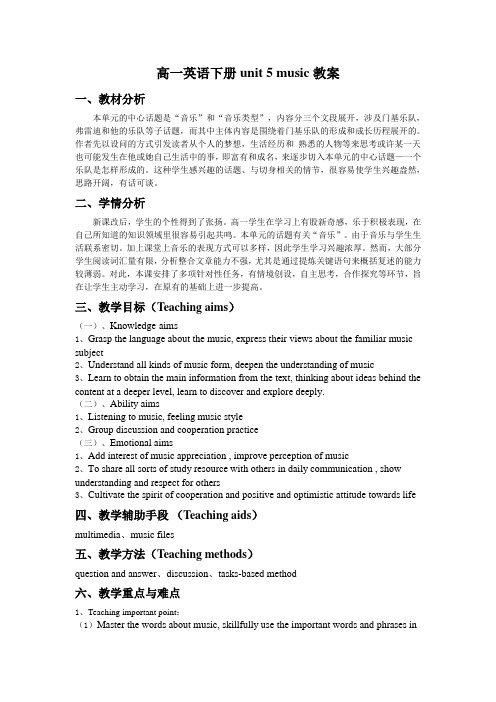
高一英语下册unit 5 music教案一、教材分析本单元的中心话题是“音乐”和“音乐类型”,内容分三个文段展开,涉及门基乐队,弗雷迪和他的乐队等子话题,而其中主体内容是围绕着门基乐队的形成和成长历程展开的。
作者先以设问的方式引发读者从个人的梦想,生活经历和熟悉的人物等来思考或许某一天也可能发生在他或她自己生活中的事,即富有和成名,来逐步切入本单元的中心话题—一个乐队是怎样形成的。
这种学生感兴趣的话题、与切身相关的情节,很容易使学生兴趣盎然,思路开阔,有话可谈。
二、学情分析新课改后,学生的个性得到了张扬。
高一学生在学习上有股新奇感,乐于积极表现,在自己所知道的知识领域里很容易引起共鸣。
本单元的话题有关“音乐”。
由于音乐与学生生活联系密切。
加上课堂上音乐的表现方式可以多样,因此学生学习兴趣浓厚。
然而,大部分学生阅读词汇量有限,分析整合文章能力不强,尤其是通过提炼关键语句来概括复述的能力较薄弱。
对此,本课安排了多项针对性任务,有情境创设,自主思考,合作探究等环节,旨在让学生主动学习,在原有的基础上进一步提高。
三、教学目标(Teaching aims)(一)、Knowledge aims1、Grasp the language about the music, express their views about the familiar music subject2、Understand all kinds of music form, deepen the understanding of music3、Learn to obtain the main information from the text, thinking about ideas behind the content at a deeper level, learn to discover and explore deeply.(二)、Ability aims1、Listening to music, feeling music style2、Group discussion and cooperation practice(三)、Emotional aims1、Add interest of music appreciation , improve perception of music2、To share all sorts of study resource with others in daily communication , show understanding and respect for others3、Cultivate the spirit of cooperation and positive and optimistic attitude towards life四、教学辅助手段(Teaching aids)multimedia、music files五、教学方法(Teaching methods)question and answer、discussion、tasks-based method六、教学重点与难点1、Teaching important point:(1)Master the words about music, skillfully use the important words and phrases inthe text(2)learn attributive clause lead by prep+which/whom2、Teaching difficult point:(1)To master and apply some basic reading skills(2)Sort out the article context and sum up the main ideas of the text七、教学过程(Teaching procedures)1、lead-inPlay a piece of music, let the students guess what type of music it is, and then enter the first part of textbook warming up, discuss the various music styles of music. Ask questions, what is the classmates favorite type of music?The reason?2、pre-readingGroup discussion of several problems of the book, do it for the next reading.3、Reading(1)SkimmingSkim the whole passage and get the main content of this article at the same time, complete the second question in the comprehending part , understand the main content of each paragraph.(2)ScanningAsk several students to read the passage , explain the new words and plete the questions in the learning about language part to consolidate it.4、post readingLook at discovering useful structures part , guide students to find answers by themselves , summarize and induce the preposition + which/whom structure, explain the use of the attributive clause.八、课堂板书设计(Blackboard design)Divide the blackboard into two parts, write learning objectives, new words and phrases on the left part of the blackboard , on the right side of the blackboard writing teaching steps that will help reading and remove obstacles.九、教学反思( Teaching reflection)以学生为主体,任务型教学主线,合作教学为原则,学生的每一个活动都具有明确的目的指向性和具体的操作要求,任务设计符合学生的认知规律,绝大多数同学能受益颇多。
人教版高中英语必修2《Unit5Music》教案

人教版高中英语必修2《Unit5Music》教案人教版高中英语必修2《Unit 5 Music》教案【一】教学准备教学目标1.知识目标: 1)Students should learn some useful words and phrases: musician, clap, passer-by, form, extra, earn, advertisement, 2 attractive, instrument, loosely, actor dream of, be honest with, play jokes on, or so, break up. 3)Students should understand the general idea of the passage2.语言能力目标:1)Develop the Ss’skills of skimming, scanning and careful reading. 2) Train the Ss to find the key words and the topic sentences. 3)Encourage the Ssto guess the new words according the reading.3.情感态度与文化意识目标:1)Encourage the Ss to share the different kinds of music. 2)Improve the cooperation and share among the students.教学重难点1、教学重点:a.To understudend the passage better b.To find the main idea of each paragraph2、教学难点:a.Master the reading ability b.Develop the skills of reading教学过程教学设计本节课共45分钟,具体教学步骤如下:Step I Leading-in播放一段小视频,内容为歌曲 If you are happy的英文版本,通过介绍演唱乐队twins引出本单元话题。
高中英语必修二Unit5_Music教案
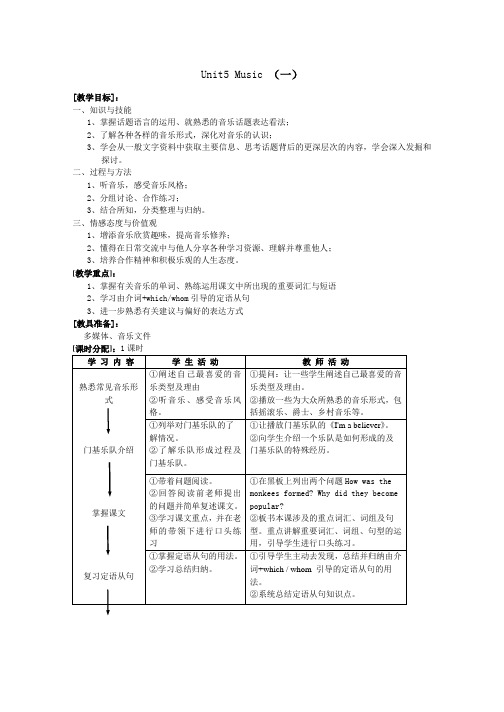
Unit5 Music (一)[教学目标]:一、知识与技能1、掌握话题语言的运用、就熟悉的音乐话题表达看法;2、了解各种各样的音乐形式,深化对音乐的认识;3、学会从一般文字资料中获取主要信息、思考话题背后的更深层次的内容,学会深入发掘和探讨。
二、过程与方法1、听音乐,感受音乐风格;2、分组讨论、合作练习;3、结合所知,分类整理与归纳。
三、情感态度与价值观1、增添音乐欣赏趣味,提高音乐修养;2、懂得在日常交流中与他人分享各种学习资源、理解并尊重他人;3、培养合作精神和积极乐观的人生态度。
[教学重点]:1、掌握有关音乐的单词、熟练运用课文中所出现的重要词汇与短语2、学习由介词+which/whom引导的定语从句3、进一步熟悉有关建议与偏好的表达方式[教具准备]:多媒体、音乐文件[引入新课]:提出问题;同学们最喜爱的音乐类型是什么?理由?[讲解词]:音乐是我们日常生活中表达喜悦、忧伤、幸福、忧愁等诸多情感的媒介,也是大家十分喜爱的艺术形式,要让大家说出自己喜爱的歌手或者音乐家我相信大家一定可以说出好多来。
今天我想和同学们探讨一下,大家平时喜爱的音乐类型,对这些音乐类型的了解和体会,我也很想听听同学们对这些音乐类型的看法,给大家讲讲为什么喜欢这种音乐类型?(选若干同学们回答)(适当总结学生所讲)同学们对所喜爱的音乐类型理由的阐述也是各有道理,所谓萝卜白菜各有所爱,每个人都有自己独特的个人喜好,对音乐类型的偏好也是如此。
也许某一天你们之中有人会成为音乐家,或者有人会成立乐队,给大家带来好听的音乐作品,丰富大家的精神生活。
[讲授新课]:一、介绍门基乐队[提出问题]:同学们有没有听过门基乐队?门基乐队有哪些作品?[学生讨论]:对门基乐队的了解。
门基乐队是一只美国本土乐队,由四人组成,于二十世纪60年代兴起,最初,乐队成员是应一则电视广告走到一起的。
主要作品有《Waiting For The Sun》、《The Unknown Soldier》、《The Soft Parade》、《Morrison Hotel》[运用教具]:播放门基乐队的《I'm a believer》给学生听,使他们亲耳感受门基乐队的风格特点。
高中英语人教版(2022)必修第二册Unit5Music单元教案案(含答案)
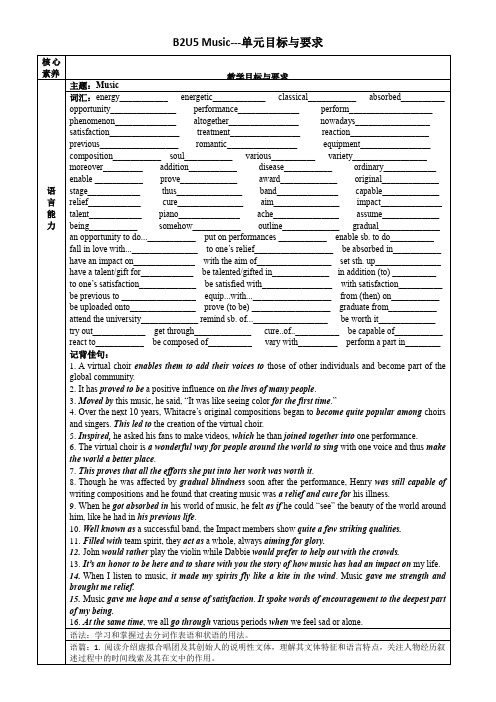
B2U5 Music---单元目标与要求语法:过去分词作表语和状语一、过去分词作表语1.过去分词可放在系动词be, get, feel, look, sound, taste, smell, remain, seem,become等之后作表语, 表示主语所处的状态。
1). He seemed quite ______________(delight) at the news.2). The door remained ____________(lock) when we arrived.2. 过去分词作表语多表示人自身的感觉、感受或事物自身的状态;现在分词作表语则多表示事物具有的特征,常译作“令人...的”。
常用的这类词有:exciting/excited; astonishing/astonished delighting/delighted moving/moved disappointing/disappointed encouraging/encouraged frightening/frightened interesting/interested3). The story they heard over the radio was very _____________(move).4). They were _____________ to hear the _______________ sound.(frighten)3. 过去分词作表语和被动语态的区别“be+过去分词”表状态时,是系表结构,此时过去分词通常已形容词化;表动作时,是被动语态,且绝大多数被动结构中的动作执行者由介词by引出。
5). 这本书写得好。
______________________________________________________________6). 这本书是鲁迅写的。
__________________________________________________________二、过去分词(短语)作状语1. 主从句主语一致,可以省略状语从句中的主语,省略的主语和动词主动关系用doing,被动关系则用done。
高中英语Unit5Music教案1-新人教版

高中英语Unit5Music教案1-新人教版教学目标1.了解和掌握与音乐有关的词汇和表达方式。
2.能够理解和解读与音乐有关的文章、歌词和视频。
3.通过学习和欣赏音乐,激发学生的音乐兴趣和审美能力,培养学生的情感和文化修养。
教学重点1.掌握与音乐有关的词汇和表达方式。
2.能够解读歌词,理解歌曲背后的情感和意义。
3.学习欣赏音乐,提高音乐欣赏和鉴赏能力。
教学难点1.如何解读歌词的情感和意义。
2.如何听懂和欣赏不同类型的音乐。
教学过程Step 1 导入新思维1.听一首英文歌曲,观察歌词中有哪些与音乐有关的词汇。
2.小组讨论,总结出所有相关词汇,整理成思维导图或表格。
Step 2 阅读文章1.分组阅读文章《Music and Emotion》。
2.每组讨论文章内容,回答问题:•What is music?•How does music affect our emotions?•What are the similarities and differences between music and language?3.汇报讨论结果,让整个班级进行讨论,共同探讨音乐与情感的关系。
Step 3 学习歌词1.听一首英文歌曲,观察歌词中的情感和意义。
2.逐行解读歌词,让学生理解其中的情感和意义。
3.让学生尝试用自己的语言表达歌曲背后的故事和情感。
Step 4 音乐欣赏1.播放一段不同类型的音乐,如:古典音乐、摇滚音乐、流行音乐等。
2.学生边听边记录,听完后讨论这段音乐的特点,以及它所传达的情感和意义。
3.让学生分享自己最喜欢的音乐,介绍其特点和背后的故事。
课后作业1.记录一个自己喜欢的音乐的背景和故事,以及它给自己带来的情感和启示。
2.搜索一位自己喜欢的音乐人或乐队,了解他们的音乐历程和代表作品,并选取其中一首歌曲进行分享。
总结与反思通过本节课的学习,学生们进一步了解了音乐和情感的关系,学会了用英语表达音乐和歌曲的背后故事和情感。
人教版高中英语必修第二册 《Unit 5 Music》教案
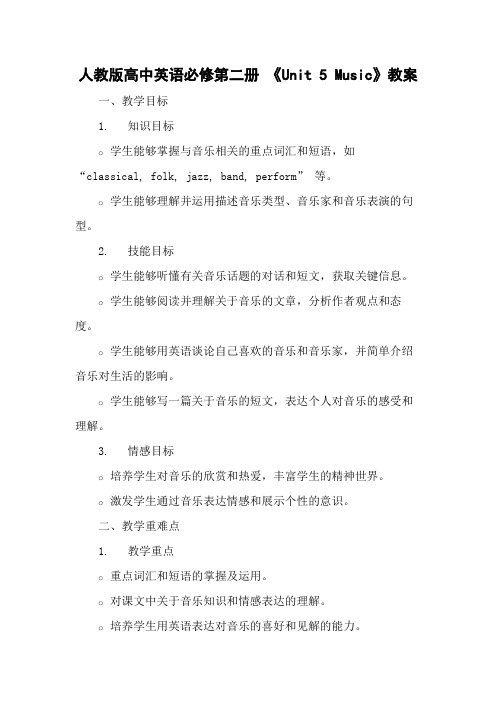
人教版高中英语必修第二册 《Unit 5 Music》教案一、教学目标1.知识目标o学生能够掌握与音乐相关的重点词汇和短语,如 “classical, folk, jazz, band, perform” 等。
o学生能够理解并运用描述音乐类型、音乐家和音乐表演的句型。
2.技能目标o学生能够听懂有关音乐话题的对话和短文,获取关键信息。
o学生能够阅读并理解关于音乐的文章,分析作者观点和态度。
o学生能够用英语谈论自己喜欢的音乐和音乐家,并简单介绍音乐对生活的影响。
o学生能够写一篇关于音乐的短文,表达个人对音乐的感受和理解。
3.情感目标o培养学生对音乐的欣赏和热爱,丰富学生的精神世界。
o激发学生通过音乐表达情感和展示个性的意识。
二、教学重难点1.教学重点o重点词汇和短语的掌握及运用。
o对课文中关于音乐知识和情感表达的理解。
o培养学生用英语表达对音乐的喜好和见解的能力。
2.教学难点o如何帮助学生准确运用丰富的词汇和句型描述音乐。
o引导学生深入理解音乐的内涵和价值。
三、教学方法1.视听教学法:通过播放音乐、视频等让学生直观感受音乐的魅力。
2.讨论交流法:组织学生讨论音乐相关话题,促进学生思维碰撞和语言表达。
3.情景创设法:创设音乐场景,让学生在情境中学习和运用语言。
四、教学过程(一)导入(5 分钟)1.播放一段不同类型的音乐片段,如古典音乐、流行音乐、摇滚音乐等。
2.提问学生:What kinds of music do you hear? How do they make you feel?(二)词汇教学(10 分钟)1.展示本单元的重点词汇和短语,结合音乐实例进行讲解。
2.开展词汇游戏,如音乐词汇猜猜猜,加强学生对词汇的记忆和理解。
(三)阅读前准备(5 分钟)1.让学生观察课文标题和图片,预测文章内容。
2.提出一些引导性问题,如:What do you think thepassage will be about music?(四)课文阅读(15 分钟)1.学生快速阅读课文,概括文章的主要内容。
unit5music课程设计
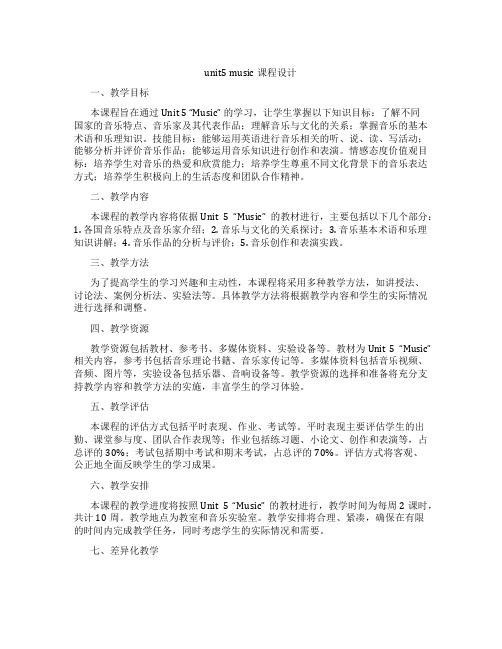
unit5 music课程设计一、教学目标本课程旨在通过Unit 5 “Music” 的学习,让学生掌握以下知识目标:了解不同国家的音乐特点、音乐家及其代表作品;理解音乐与文化的关系;掌握音乐的基本术语和乐理知识。
技能目标:能够运用英语进行音乐相关的听、说、读、写活动;能够分析并评价音乐作品;能够运用音乐知识进行创作和表演。
情感态度价值观目标:培养学生对音乐的热爱和欣赏能力;培养学生尊重不同文化背景下的音乐表达方式;培养学生积极向上的生活态度和团队合作精神。
二、教学内容本课程的教学内容将依据Unit 5 “Music” 的教材进行,主要包括以下几个部分:1. 各国音乐特点及音乐家介绍;2. 音乐与文化的关系探讨;3. 音乐基本术语和乐理知识讲解;4. 音乐作品的分析与评价;5. 音乐创作和表演实践。
三、教学方法为了提高学生的学习兴趣和主动性,本课程将采用多种教学方法,如讲授法、讨论法、案例分析法、实验法等。
具体教学方法将根据教学内容和学生的实际情况进行选择和调整。
四、教学资源教学资源包括教材、参考书、多媒体资料、实验设备等。
教材为Unit 5 “Music” 相关内容,参考书包括音乐理论书籍、音乐家传记等。
多媒体资料包括音乐视频、音频、图片等,实验设备包括乐器、音响设备等。
教学资源的选择和准备将充分支持教学内容和教学方法的实施,丰富学生的学习体验。
五、教学评估本课程的评估方式包括平时表现、作业、考试等。
平时表现主要评估学生的出勤、课堂参与度、团队合作表现等;作业包括练习题、小论文、创作和表演等,占总评的30%;考试包括期中考试和期末考试,占总评的70%。
评估方式将客观、公正地全面反映学生的学习成果。
六、教学安排本课程的教学进度将按照Unit 5 “Music” 的教材进行,教学时间为每周2课时,共计10周。
教学地点为教室和音乐实验室。
教学安排将合理、紧凑,确保在有限的时间内完成教学任务,同时考虑学生的实际情况和需要。
2020年新人教版《Unit 5 Music》单元教案全套(附导学案)1

《Unit 5 Music》单元教案Unit 5 MusicListening and Speaking【教学目标】1. Instruct students to get main facts by listening and motivate them to talk about the topics about music, the types of music, and how the music makes them feel.2. Develop students’ sense of cooperative learning and individual thinking capability.3. Develop students’ different listening skills to solve different listening comprehensive problems.4. Help students to under stand how to use the structures “past participle as adverbial”.【教学重难点】Prompt students to talk about the related topics, such as types of music they know, their favourite type of music, how music makes them feel, and how to use past participle as adverbial.【教学过程】Step 1 Lead inThe teacher is advised to talk with their students about music.Boys and girls, before we listen, let’s work in pairs and discuss what type of music you know.Which type is your favorite? How does it make you feel? Share your ideas with partners.I know Chinese traditional music/classical music/country music/hip-hop/jazz/pop music/Latin music/rap/rock/punk…I like classical music. It makes me feel full of energy and happy.Step 2: PredictionAfter their small talk, the teacher can move on by finishing the following task: See the pictures and give the correct answers.1. What are the people doing in the picture below?2. Match the pictures with the correct types of music.A. Chinese traditionalB. classicalC. country musicD. hip-hop1_______________2_______________3_______________4_______________Step 3: Summary of the main ideaListeningI. Play the radio about The Sound of Music (音乐之声), and let students finish the following tasks.A star has come out to tell me1.___________________ to goBut deep in the dark-green shadowsAre voices that urge me to staySo I pause and I wait and I listenFor one more sound for one more lovely thing2.___________________ might say…The hills are alive with the sound of musicWith songs they have sung 3.__________________The hills fill my heart with the sound of musicMy heart 4.__________________ every song it hearsMy heart wants to beat like the wings of the birds that rise from the lake to the treesMy heart wants to sigh like the chime that flies from a church on a breezeTo laugh like a brook 5.__________________ and falls over stones in its wayTo sing through the night like a lark who is 6._____________I go to the hills when my heart is lonelyI know I will hear what I’ve heard beforeMy heart will 7.______________ the sound of musicAnd I’ll sing once moreII. The reporter paraphrased some of the answers the students gave him. Listen to the interviews again and complete the sentences with the words you hear.1. A: Country music touches my heart.B: So you like music that’s _______of _______?2. A: When I listen to hip-hop, I just have to move!B: So it makes you want to _______?3. A: Classical music makes m e feel like I’m sitting beside a quiet stream and enjoying nature.B: So to you, it’s _______ and _______?Learning new wordsList the new words in the lesson, tell students the meaning of these words and give some examples.News words: classical, energy, soul…Talking projectGuide students to do speaking practice.I. Talk in pairs. Interview each other about music. Use the picture below for ideas.A: What kind of music do you like?B: I like techno music.A: What makes it so special to you?B: I like to listen to it when l exercise. It gives me energy.II. Work in pairs or groups and role play a conversation.●Suppose you are a reporter and interviewing the students who about music.➢I like to…➢Chinese traditional song/classical music/hip-hop music/country music…➢Listen to/play/sing…Unit 5 MusicListening and Talking【教学目标】1. Instruct students to get main facts by listening and motivate them to talk about music festival, and what you would like to do in the music festival.2. Develop students’ different listening skills to solve different listening comprehensive problems.3. Help students to understand and talk about preference.【教学重难点】1. Listen to people who discuss their music festival.2. Grasp some listening skills and the rules of pronunciation.【教学过程】Step 1 Lead inThe teacher is advised to talk with their students about music festival.Boys and girls, before our listen, let’s work in pairs and discuss what music festival is.What would you like to do in the music festival? Share your ideas with partner.Step 2: Summary of the main ideaListeningLet students listen the announcement and answer the questions.What kind of songs will Grace Davis sing at the festival?Who can try out as a performer?What can those who think they do not have musical talent do?How can students volunteer to take part?Learning new wordsList news words: equipment, talent, assume, in addition (to sb./sth.) and give some examples.It is generally ___________ (assume) that stress is caused by too much work.He had a gift ___________ music when he was just 6 years old, so we allconsider him to be a ___________ (talent) musician.He a ________ (equip) himself with a street plan.他随身带着一张街道平面图。
unit5music课程设计

unit5 music课程设计一、课程目标知识目标:1. 学生能够掌握音乐基本概念,如音高、节奏、音色等;2. 学生能够了解不同国家和地区的音乐特点,认识至少三种音乐风格;3. 学生能够识别并描述音乐中的常见乐器。
技能目标:1. 学生能够通过演唱、演奏等方式,展现对音乐的理解和表达能力;2. 学生能够运用音乐软件或乐器创作简单的旋律,培养音乐创作能力;3. 学生能够通过团队合作,完成一场音乐表演。
情感态度价值观目标:1. 学生能够培养对音乐的热爱和欣赏能力,提高审美情趣;2. 学生能够尊重和理解不同文化背景下的音乐,培养跨文化意识;3. 学生能够在音乐活动中,学会合作、沟通和表达,增强自信心。
课程性质:本课程以音乐欣赏和创作为主线,结合实践与理论,旨在提高学生的音乐素养。
学生特点:五年级学生具备一定的音乐基础,好奇心强,喜欢尝试新鲜事物,但注意力集中时间有限。
教学要求:注重启发式教学,激发学生兴趣,鼓励学生参与实践,培养自主学习能力。
教学过程中,关注学生个体差异,给予个性化指导。
通过课程目标的分解,确保学生达到预期学习成果,为后续教学设计和评估提供依据。
二、教学内容本章节教学内容主要包括以下三个方面:1. 音乐基本概念:- 音高:学习乐谱中的音高标记,如高音谱号、低音谱号;- 节奏:认识常见节奏符号,如全音符、二分音符、四分音符等;- 音色:了解不同乐器的音色特点,如弦乐、木管、铜管等。
2. 不同国家和地区的音乐特点:- 学习我国民族音乐,如《茉莉花》、《梁祝》等;- 了解西方古典音乐,如贝多芬、莫扎特等作曲家的作品;- 探索世界音乐,如非洲鼓乐、拉丁音乐等。
3. 音乐创作与实践:- 学习使用音乐软件,如GarageBand等,创作简单旋律;- 乐器演奏:练习吹、拉、弹、打等基本技巧,学会演奏一首曲目;- 团队合作:分组进行音乐表演,包括演唱、演奏、编排等。
教学内容安排与进度:第一课时:音乐基本概念(音高、节奏、音色)第二课时:不同国家和地区的音乐特点(我国民族音乐、西方古典音乐)第三课时:不同国家和地区的音乐特点(世界音乐)第四课时:音乐创作与实践(音乐软件、乐器演奏)第五课时:团队合作(音乐表演)教材章节:本教学内容与课本Unit 5音乐章节相关联,涵盖了音乐基本概念、音乐风格、音乐创作与实践等方面内容。
人教版初中英语八年级上册Unit 5 Music 教案2023
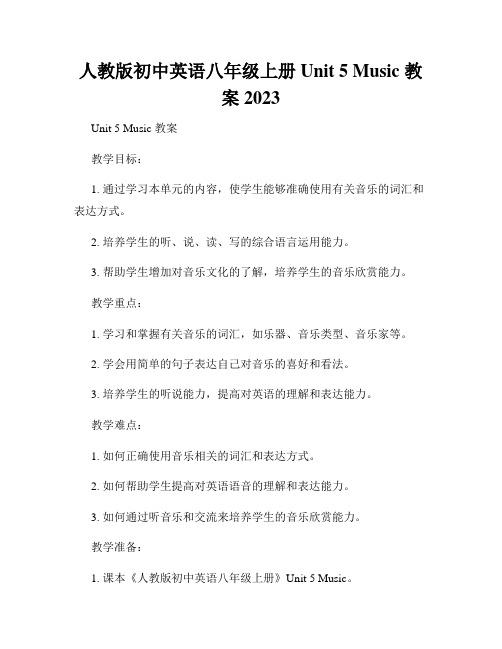
人教版初中英语八年级上册Unit 5 Music 教案2023Unit 5 Music 教案教学目标:1. 通过学习本单元的内容,使学生能够准确使用有关音乐的词汇和表达方式。
2. 培养学生的听、说、读、写的综合语言运用能力。
3. 帮助学生增加对音乐文化的了解,培养学生的音乐欣赏能力。
教学重点:1. 学习和掌握有关音乐的词汇,如乐器、音乐类型、音乐家等。
2. 学会用简单的句子表达自己对音乐的喜好和看法。
3. 培养学生的听说能力,提高对英语的理解和表达能力。
教学难点:1. 如何正确使用音乐相关的词汇和表达方式。
2. 如何帮助学生提高对英语语音的理解和表达能力。
3. 如何通过听音乐和交流来培养学生的音乐欣赏能力。
教学准备:1. 课本《人教版初中英语八年级上册》Unit 5 Music。
2. 录音机和音乐播放设备。
3. 教学课件和教学素材,包括图片、英语歌曲等。
教学过程:Step 1:Warm-up1. Greet the students and review the previous lesson about hobbies.2. Play a popular English song and ask the students if they know the song and the singer. Have a short discussion about their favorite songs and singers.Step 2:Vocabulary and Listening1. Introduce and teach new vocabulary words related to music, such as instruments, music genres, musicians, etc.2. Play an audio recording featuring different musical instruments and ask the students to identify each instrument. Discuss their favorite instrument and why.3. Play another audio recording featuring different music genres and ask the students to listen and match each genre with its description. Discuss their favorite genre and why.Step 3:Speaking and Writing1. Divide the students into pairs or small groups and have them discuss their favorite music, including genres, singers, and songs. Encouragestudents to ask each other questions using the vocabulary words they have learned.2. Ask several pairs or groups to share their favorite music with the whole class, and encourage other students to ask questions or share their thoughts.3. Have the students write a short paragraph about their favorite music, using the vocabulary words and sentence structures they have learned. Encourage creativity and provide assistance if needed.Step 4:Listening and Speaking1. Play a short English song and ask the students to listen carefully and try to understand the lyrics.2. Provide the students with the lyrics of the song and have them read and sing along. Encourage the students to pay attention to pronunciation and intonation.3. Divide the students into pairs or small groups and have them practice singing the song together. Pay attention to correct pronunciation and rhythm.Step 5:Extension Activities1. Show the students pictures of famous musicians or bands and ask them to guess their names. Provide some information about each musician or band and encourage the students to share their thoughts or ask questions.2. Play a popular English song with simple lyrics and ask the students to listen and try to fill in the missing words. Discuss the song lyrics and the students' understanding of the song.3. Assign a music-related project or presentation to the students, such as creating a poster about their favorite musician or band, writing a short review of a concert they attended, or giving a presentation about the history of a specific music genre.Step 6:Summary and Homework1. Summarize the key points and vocabulary words covered in the lesson.2. Assign homework, such as writing a diary entry about a music-related event they experienced, or researching a famous musician and writing a short biography.教学反思:本节课通过引入热身活动和多种教学方法,使学生对音乐有了更深入的了解,学会了描述自己喜欢的音乐和音乐家,并提高了他们的听说能力。
高中英语Unit5Music教案新人教版必修2

高中英语Unit5Music教案新人教版必修2Unit5 Music课标分析1.语言知识目标:1)学会使用课标要求的次回合习惯用语或固定搭配,学生能够正确读写及运用重点单词和词组2)使用适当的语言形式描述事物、简单地表达观点、态度或情感,学生能够认出并运用介词+which/whom 的定语从句的语法。
2.语言技能目标:1)能理解文章主旨和作者意图。
能通过上下文客服生词困难,理解语篇意义。
2)强化略读、查读等阅读技能,训练通过寻找关键词,主题句等方式更快速并准确地确定文章的段落大意,理清文章的总体框架与脉络。
3)继续运用已经掌握的基本猜词技巧猜测文章中的部分单词。
4)能在小组讨论后用英语表达出乐队的形成过程。
3.情感态度与文化意识目标:1)了解各种音乐形式,了解The Monkees组合的发展历程,接触不同地区的音乐,深化对音乐的认识,提高音乐素养。
2)在小组合作互动中,增强学生的团队合作精神与分享意识。
3)能通过对门基儿乐队的学习。
初步了解英语国家的文学家、艺术家、科学家等成就、贡献等。
4.学习策略1).通过网络搜寻、查阅图书等手段探究与音乐有关的文化背景,增强迅速获取信息、处理信息的能力;在查找The Monkees的相关信息的过程中整合网络信息的资源利用策略。
2).通过小组讨论分析问题、探讨阅读技巧、根据阅读策略和技巧来获取音乐的信息,从而读懂懂文章的大意和重要细节;培养在小组合作学习和自主探究学习中成长的调控策略。
教材分析本单元“Music”是高中英语教材中与英语学习相关的一重要话题,也是新课标文化意识的一个重要组成部分。
“阅读”部分主要介绍了门基乐队的成长过程。
文章先介绍了一个乐队形成的通常过程:在课堂设计中先通过视频导入,然后通过快速阅读让学生了解文章主旨大意,锻炼学生的快速提取信息能力。
然后再进行细节阅读,以前两段为一个整体,来设置问题。
锻炼学生对细节信息的定位能力。
在第三、四段又描述了一支有特殊成长经历的门基乐队,一次失败的电视选秀,一支流行乐队的诞生。
Unit 5 Music 教案
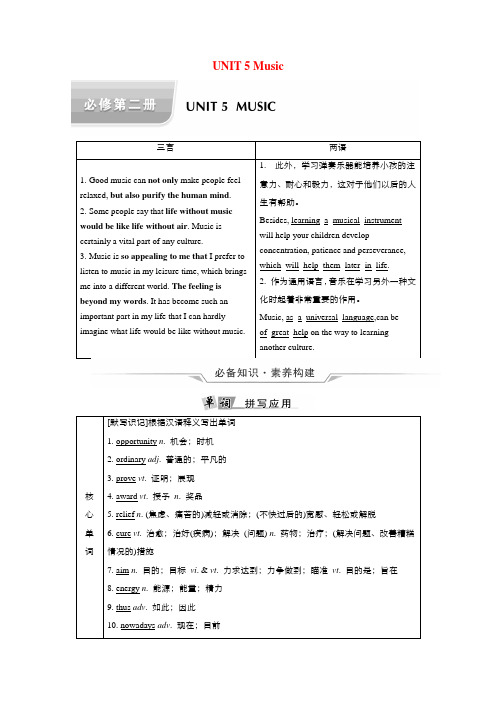
UNIT 5 Music三言两语1. Good music can not only make people feel relaxed, but also purify the human mind.2. Some people say that life without music would be like life without air. Music is certainly a vital part of any culture.3. Music is so appealing to me that I prefer to listen to music in my leisure time, which brings me into a different world. The feeling is beyond my words. It has become such an important part in my life that I can hardly imagine what life would be like without music. 1. 此外,学习弹奏乐器能培养小孩的注意力、耐心和毅力,这对于他们以后的人生有帮助。
Besides, learning_a_musical_instrument will help your children develop concentration, patience and perseverance, which_will_help_them_later_in_life.2. 作为通用语言,音乐在学习另外一种文化时起着非常重要的作用。
Music, as_a_universal_language,can beof_great_help on the way to learning another culture.核心单词[默写识记]根据汉语释义写出单词1. opportunity n. 机会;时机2. ordinary adj. 普通的;平凡的3. prove vt. 证明;展现4. award vt. 授予n. 奖品5. relief n. (焦虑、痛苦的)减轻或消除;(不快过后的)宽慰、轻松或解脱6. cure vt. 治愈;治好(疾病);解决(问题) n. 药物;治疗;(解决问题、改善糟糕情况的)措施7. aim n. 目的;目标vi. & vt. 力求达到;力争做到;瞄准vt. 目的是;旨在8. energy n. 能源;能量;精力9. thus adv. 如此;因此10. nowadays adv. 现在;目前20. metaphor n. 暗喻;隐喻21. personification n. 拟人;人格化;化身22. repetition n. 重复;重做23. simile n. 明喻24. outline n. & vt. 概述;概要25. onto prep. (朝)向26. conductor n. (乐队、合唱团等的)指挥;(公共汽车的)售票员27. hip-hop n. 嘻哈音乐;嘻哈文化28. phenomenon n. 现象熟词生义1. (2020·全国卷Ⅱ)The family called the Italian Culture Ministry; the official confirmed that the paintings were originals and worth as much as $50 million. 原作2. If there is no president, power will be assumed by the most extremist forces. 掌管;夺取3. (2018·江苏卷)The economic impact of the arts is often overlooked and badly judged. 冲击力高频短语短语应用1. absorbed_in_sth./sb.被……吸引住;专心致志2. try_out参加……选拔(或试演)3. in_addition_(to_sb./sth.) 除……以外(还)4. from_(then)_on 从(那)时起5. fall_in_love_with爱上6. get_through (设法)处理;完成7. feel_like 想要……;感觉像8. come_up_with提出;想出9. on_stage 在舞台上10. set_sth._up 安装好(设备或机器) [语境运用1]填入一个适当的词1. I couldn't get through to Hannah. Her brother was talking on the phone all the time!2. In addition to these arrangements, extra ambulances will be on duty until midnight.3. He came up with a good solution to the problem at the meeting.[语境运用2]填入一个适当的词He was given a football as a birthday gift at the age of three. From then 1. on,he has been absorbed 2. in playing football. In 3. addition,he wants to try 4. out for the football team when he grows up.教材原句背诵句式仿写应用1. while引导时间状语从句Imagine having the opportunity to sing together with hundreds of other people while you are at home alone. 当我在那个美丽的国家从事志愿者工作时,我结交了很多新朋友。
Unit 5 music教案
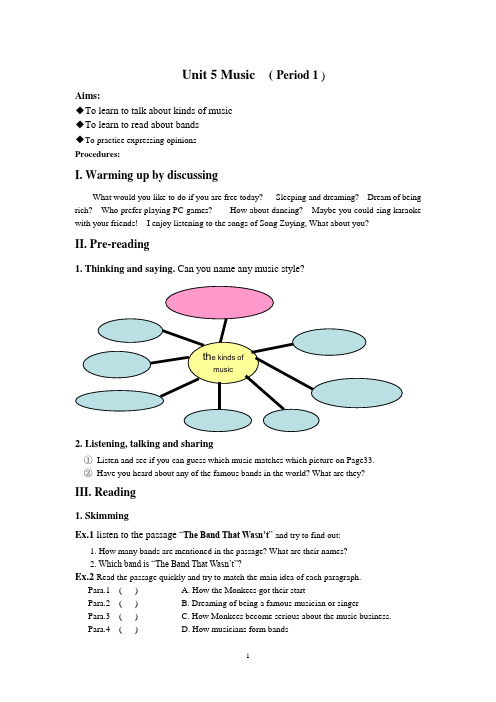
Unit 5 Music ( Period 1 )Aims:◆To learn to talk about kinds of music◆To learn to read about bands◆To practice expressing opinionsProcedures:I. Warming up by discussingWhat would you like to do if you are free today?Sleeping and dreaming? Dream of being rich? Who prefer playing PC games? How about dancing? Maybe you could sing karaoke with your friends! I enjoy listening to the songs of Song Zuying, What about you?II. Pre-reading1. Thinking and saying. Can you name any music style?2. Listening, talking and sharing①Listen and see if you can guess which music matches which picture on Page33.②Have you heard about any of the famous bands in the world? What are they?III. Reading1. SkimmingEx.1 listen to the passage “The Band That Wasn’t”and try to find out:1. How many bands are mentioned in the passage? What are their names?2. Which band is “The Band That Wasn’t”?Ex.2 Read the passage quickly and try to match the main idea of each paragraph.Para.1 ( ) A. How the Monkees got their startPara.2 ( ) B. Dreaming of being a famous musician or singerPara.3 ( ) C. How Monkees become serious about the music business.Para.4 ( ) D. How musicians form bands2. ScanningEx.3 Read the passage carefully and decide if the following are true or false.1). Students form a bnd to play in the street so that then can attract passers-by. ( )2). The Monkees liked to play jokes on each other. ( )3). The Beatles was based on the Monkees. ( )4). The band sang songs of their own at first and after they became famous they began toproduce their ownrecords. ( )5). The Monkees broke up in about 1970 and reunited in the mid-1980s. ( )3. ConsolidationIV. Post reading1. Summary.2.Discussion Now in pairs discuss the following questions and make up a dialogue.What kind of music do you like ? Which singer do you like best and why?These phrases will help you.I prefer…; I hate….; I am fond of…;I like …best because…;My favorite singer is…; I enjoy listening to…; Why do you prefer…;I don’t like… very much.Sample dialogue:A: What kind of music do you like, pop music or …?B: I like…, because…A: Who is your favorite singer?B: Well, I prefer /like… Her/his music makes me feel…Who do you prefer?A: I like ….V. Homework assignment1. Read the text fluently and prepare to retell the text.2. Preview the language points.。
高中英语Unit 5 Music教案2 新课标 人教版 必修2 教案

Unit 5 MusicPart One: Teaching DesignPeriod 1: A sample lesson plan for reading(THE BAND THAT WASN’T)Aims◆To learn to talk about kinds of music◆To learn to read about bands◆To study The Attributive Clause (in/ for/ with/ by+which/ whom)◆To learn to write an e-mailProceduresI. Warming upWarming up by describingGood morning, class. Today we are going to talk about an interesting topic --- music. As we know, music is a kind of art of making pleasing combinations of sounds in rhythm, harmony and counterpoint. Music can produce a lively and happy atmosphere and bring people relaxation after hard work, which can reduce the tiredness. Listening to music also makes people feel happy and nice. How many do you know about music? Can you tell about different kinds of music? Now turn to page 33, look at the pictures, read the captions and listen to the different kinds of music. See if you can guess which music matches with which picture. Warming up by discussingHi, everyone. Do you like music? How much do you know about music? Can you tell about the different kinds of music? Please turn to page 33. Look at the pictures. Let’s listen to some music. Let’s see if you can guess which music matches with which picture.Classical music Country music Rock ‘n’ RollRap Orchestra Folk musicYes, you are right. I’m sure you will really enjoy yourselves after listening to all these beautiful music. What kind of music do you like better, Chinese or Western, classical or modern? Why? How does music make you feel? Why do you like to listen to music? Let’s discuss these questions in small groups. Try to share your opinions with one another.II. Pre-reading1.Thinking and sayingHave you heard about any of the famous bands in the world? List some if you can.For reference: I’ve heard about “The Beatles”, “Back Street Boys”, “The Eagles”,“West life” and “Pink Floyd”.2.Listening, talking and sharingLet’s listen to some pieces of music from different bands. Work in groups of four. Tell your group mates which band you like best. Why? Then the group leader is to stand up and share the group idea with the class. For reference: I am from Group 1. Our group likes “The Beatles” best. We like theirstyle of performances. Listening to their performances, we will feel relaxed, amused,and their performances make us think a lot about life.Do you know anything about “The Monkees”?For reference: “The Monkees”is a band that was first popular in the 1960s inAmerica. Unlike most bands of the time, the Monkees were not formed by itsmembers but rather by TV producers. They were a fictional band in the TV show ofthe same name. The band was composed of Mike Nesmith, Mickey Dolenz, DavyJones, and Peter Tork. All the members had some musical experience. Let’s come tothe reading --- The Band That Wasn’t and find more about them.III. Reading1.Reading aloud to the recordingNow please listen and read aloud to the recording of the text THE BAND THAT WASN’T. Pay attention to the pronunciation of each word and the pauses within each sentence. I will play the tape twice and you shall read aloud twice, too.2.Reading and underliningNext you are to read and underline all the useful expressions or collocations in the passage. Copy them to your notebook after class as homework.Collocations from THE BAND THAT WASN’Tdream of doing , at a concert , with sb. clapping and enjoying …, sing karaoke , behonest with oneself, get to form a band, high school students, practice one’s music,play to passers-by, in the subway, earn some extra money, begin as a TV show, playjokes on…, be based loosely on…, the TV organizers, make good music, put anadvertisement in a newspaper, look for rock musicians, pretend to do sth., theattractive performances, be copied by…, support them fiercely, become more seriousabout…, play their own instruments, produce one’s own records, start touring, breakup, in the mid-1980s, a celebration of one’s time as a real band3.Reading to identify the topic sentence of each paragraphSkim the text and identify the topic sentence of each paragraph. You may find it either at the beginning, the middle or the end of the paragraph.1st paragraph: How do people get to form a band?2nd paragraph: Most musicians meet and form a band.3rd paragraph: One band started as a TV show.4th paragraph: “The Monkees” became even more popular than “The Beatles”.3.Reading and transferring informationRead the text again to complete the tables, which list how people formed a band and how The Monkees was formed by the TV organizers and became a real band.How do people get to form a band?Members High school studentsReasons They like to write and play music.Places They practice their music in someone’s home.Forms They may play to passers-by in the street or subway.Results They can earn some extra money. They may also have a chance todream of becoming famous.How was The Monkees formed and became a real band?The Monkees in 1968 (left to right): Micky Dolenz, Peter Tork, MikeNesmith & Davy Jonesbeginning of the band It began as a TV show.style of theperformanceThey played jokes on each other as well as played music.first music and jokes Most of them were based loosely on the band called “TheBeatles”.development of thebandThey became more serious about their work and started toplay their own instruments and write their own songs likea real band. They produced their own records and startedtouring and playing their own music.changes of the band The band broke up in about 1970, but reunited in themid-1980s. They produced a new record in 1996, whichwas a celebration of their time as a real band.4. Reading and understanding difficult sentencesAs you have read the text times, you can surely tell which sentences are difficult to understand. Now put your questions concerning the difficult points to me.IV. Closing downClosing down by doing exercisesTo end the lesson you are to do the comprehending exercises No. 1, 2, 3 and 4.Closing down by having a discussionDo you think the TV organizers were right to call “The Monkees” a band when they did not sing or write their own songs? Why?For reference: I don’t think the TV organizers were right to call “The Monkees”aband when they did not sing or write their own songs because singing and writing itsown songs was the basis of a band.Do you agree that the jokes were more important than the music for this band? Give a reason.For reference: Yes. I think it is the jokes that really attract more fans.No. I think the purpose of forming a band is getting people to enjoy the spirit ofmusic. It’s more important than playing jokes just to make people laugh.Closing down by retelling the form of the band The Monkees.I shall write some key words and expressions on the board. You are to retell the form of the band according to these words.For reference: begin as a TV show, the TV organizers, look for, put an advertisementin a newspaper, use actors for the other members of the band, pretend to singPeriod 2: A sample lesson plan for Learning about Language(The Attributive Clause (in/ for/ with/ by+which/ whom).AimsTo help students learn about the Attributive Clause with a preposition in front. To help students discover and learn to use some useful words and expressions.To help students discover and learn to use some useful structures.ProceduresI. Warming upWarming up by discovering useful words and expressionsTurn to page 35 and do exercises No. 1, 2 and 3 first. Check your answers against your classmates’.II. Learning about grammar1.Reading and thinkingTurn to page 34 and read with me the text of THE BAND THAT WASN’t. As you read on, pay attention to The Attributive Clause (in/ for/ with/ by+which/ whom), that is, the attributive clauses with a preposition ahead of the relative pronoun shown in the sentences.For reference: The musicians of whom the band was formed played jokes on eachother as well as played music. However, after a year or so in which they became moreserious about their work, “The Monkees” started to play their own instruments andwrite their own songs like a real band.2.Doing exercises No. 1 and 2 on page 35Turn to page 34. Look at the two sentences:The musicians of whom the band was formed played jokes on each other as well as played music. However, after a year or so in which they became more serious about their work, “The Monkees” started to play their own instruments and write their own songs like a real band.Pay attention to the structure: preposition + relative pronoun. Usually only two relative pronouns --- which and whom--- can be used in the Attributive Clause, with a preposition put before the clause. That can’t be used. Look at the screen. Here are more examples on this kind of structure.1.This is the reason for which he left his hometown. (=why)2.I’ll never forget the day on which we stayed together. (=when)3.This is the girl from whom I learned the news.Now go on to do Exercise No. 2 on page 36, that is, to sort out the sentences.III. Ready used materials for The Attributive Clause (in/ for/ with/ by+which/ whom)In formal styles we often put a preposition before the relative pronouns which and whom:•The rate at which a material heats up depends on its chemical composition.•In the novel by Peters, on which the film is based, the main character is a teenager.•An actor with whom Gelson had previously worked contacted him about the role.•Her many friends, among whom I like to be considered, gave her encouragement.Notice that after a preposition you can’t use who in place of whom, and you can’t use that or zero relative pronoun either:•Is it right that politicians should make important decisions without consulting the public to whom they are accountable? (not --- the public to who they are accountable.)•The valley in which the town lies is heavily polluted. (not --- The valley in that the town...)•Arnold tried to gauge the speed at which they were traveling. (not --- the speed at they were traveling.)In informal English we usually put the preposition at the end in attributive clauses rather than at the beginning:•The office which Graham led the way to was filled with books.•Jim’s footballing ability, which he was noted for, had been encouraged by his parents.•The playground wasn’t used by those children who it was built for.In this case we prefer who rather than whom (although whom is used in formal contexts). In restrictive attributive clauses we can also use that or zero relative pronoun instead of who or which (e.g. ...the children (that) it was built for).If the verb in attributive clauses is a two-or-three-word verb (e.g. come across, fill in, go through, look after, look up to, put up with, take on) we don’t usually put the preposition at the beginning:•Your essay is one of those (which/that) I’ll go through tomorrow. (rather than...through which I’ll go tomorrow.)•She is one of the few people (who/that) I look up to. (not ... to whom I look up.)In formal written English, we often prefer to use of which rather than whose to talk about things:•A huge amount of oil was spilled, the effects of which are still being felt. (or...whose effects are still being felt.)•The end of the war, the anniversary of which is on the 16th of November, will be commemorated in cities throughout the country. (or...whose anniversary is on...)Note that we can’t use of which in place of whose in the patterns described in Unit 71B:•Dorothy was able to switch between German, Polish and Russian, all of which she spoke fluently. (not..,all whose she spoke...)We can sometimes use that...of in place of of which. This is less formal than of which and whose, and is mainly used in spoken English:•The school that she is head of is closing down. (or The school of which she is head...)Whose can come after a preposition in attributive clauses. However, it is more natural to put the preposition at the end in less formal contexts and in spoken English:•We were grateful to Mr. Marks, in whose car we had traveled home. (or...whose car we had traveled home in.)•I now turn to Freud, from whose work the following quotation is taken. (or...whose work the following quotation is taken from.)IV. Closing down by doing exercises:Join the sentence halves using which or whom after an appropriate preposition. (A)a.I would never have finished the work.b.It was primarily written.c.We know nothing.d.They got a good view.e.He learned how to play chess.f.Dennis scored three goals in the final.g.She was born.h.It was discovered.1.They climbed up to the top of a large rock.2. I would like to thank my tutor.3. She has now moved back to the house on Long Island.4. The star is to be named after Patrick Jenks.S. This is the ball.6. He is now able to beat his father.7. The book is enjoyed by adults as well as children.8. There are still many things in our solar system.Are these correct or appropriate? If they are, put a√. If they are not, give a reason, correct them and give alternatives if you can. (A)I. It's a piece of jewelry across which I came in an antique shop. --- which I came across in an antique shop. (‘came across’ is a two-word verb.)2. The extra work which she took on was starting to affect her health.3. My mother, after whom I looked for over 20 years, died last year.4. The people whom I work with are all very friendly.5. Some of the criticisms with which they had to put up were very unfair.6. He had many friends with whom he had a regular correspondence.7. The woman to who he is engaged comes from Poland.8. The forms which I had to fill in were very complicated.Rewrite these sentences so that they are more appropriate for formal written English. Use preposition + which or preposition + whose, as appropriate. (B)I. Tom Sims, whose car the weapons were found in, has been arrested. Torn Sims, in whose car the weapons were found, has been arrested.2. Tom Ham, whose novel the TV series is based on, will appear in the first episode.3. Dr Jackson owns the castle whose grounds the main road passes through.4. Tessa Parsons is now managing director of Simons, the company that she was once a secretary in.5. Allowing the weapons to be sold is an action that the Government should be ashamed of.6. The dragonfly is an insect that we know very little of.Period 3: A sample lesson plan for Using LanguageAimsTo read the story about Freddy and then enjoy and understand Beatles’ songs.To use the language by reading, listening, speaking and writing.ProceduresI. Warming up by listening and writingTurn to page 37 and read these sentences before listening to the tape. Then listen to the tape and decide true or false.II. Guided reading1.Reading and translatingRead more about Freddy’s life and translate it into Chinese paragraph by paragraph.2.Reading and underliningNext you are to read and underline all the useful expressions or collocations in the passage. Copy them toyour notebook after class as homework.3.Doing exercisesNow you are going to do exercises No. 3, 4 and 5 on page 38 following the article. Ex3: Here are the incorrect sentences which should be crossed out.1.Freddy and his band always loved being pop stars.2.His favorite program was“Top of the Pops”.3.Things went wrong because Freddy and his band hid themselves.4.They realized they had to go because they were painful.Exercise 4 Answer these questions:1.This is an open question by which students are asked about their opinions. Answers may vary.2.Answers may vary but there is information in the reading passage that may include: --- becoming rich;--- doing a job you want to do;--- having many fans;--- people enjoying your music.3.Answers may vary but information may include:--- peaceful and quiet;--- a private life away from crowds;--- a personal life which others do not discuss. Exercise 5: The main idea is No. 3. This is a story about a band that became famous and did not like it. Only No. 3 best summarizes the main idea, while all the others reflect just part of the main idea. At first, Freddy and his band wanted to be famous, but when he became famous, they were always being followed wherever they went, which they found painful.III. Guided writing1.Writing a letter for advicePlease turn to page 38 writing. Let’s read the instructions.You’d better do some brainstorming in small groups before writing your letters. You should follow theprocedure for brainstorming and outlining introduced in Module 1 Unit 2.2.Reading Freddy’s replyLet’s read Freddy’s reply and answer the questions:--- How was Freddy’s band formed?--- What advice does Freddy give?3.Writing a note and a paragraphPlease turn to page 74. Now in pairs you are going to decide on the best way to tell a foreign friend about one kind of Chinese folk music. What do you think they need to know before they can enjoy it? Why do you like it? Who are your favorite singers? Discuss it with your partner and write notes to remind you of your most important ideas. Then write a paragraph telling your foreign friend about the type of Chinese folk music you have chosen. Use a dictionary and other reference books to help you.IV. Further applyingFinding informationGo to the library to read or get online to search in order to find more information on music and musicians. Take notes of your findings and report them to your group mates next Monday morning.V. Closing down by filling a formMake use of the text and others to fill in the form below.How do people form a bandMembersReasonsPlacesFormsResultsClosing down by describing a bandTo end this period, I am going to have two of you to describe to the class a band whom you appreciates. Who’d like to speak first?Part Two: Teaching Resources (第二部分:教学资源)Section 1: A text structure analysis of THE BAND THAT WASN’TI. Type of writing and summary of the ideaType of writing This is a piece of narrative writing.Main idea of the passage The band The Monkees was formed in quite adifferent way. It started as a TV show, withmusicians played jokes on each other as well asplayed music, based loosely on the band called TheBeatles. As time went on, their attractiveperformances gained fiercely support from their fans.With their own particular style of performing theirband at last became very popular in the USA.Topic sentence of 1stparagraphHave you ever wanted to be a famous singer ormusician?Topic sentence of 2ndparagraphMost musicians meet and form a band because theylike to play music.Topic sentence of 3rdparagraphHowever, there was one band that started in adifferent way.Top sentence of 4th paragraph Their attractive performances were copied by othergroups and their fans supported them fiercely.II. A tree diagramIII. A retold passage of the text1. A possible version:Dreaming ofbeing a famousmusician orHowmusiciansHow TheMonkees gotHow The Monkeesbecame seriousabout the musicBeing a famous singer or musician may be the dream of many people. Becoming a member of a band may help you realize the dream. But just how can people form a band?Most musicians often meet and form a band for they are congenial with each other. High school students may also form a band to practice music together or sometimes play in the street to passers-by to earn some extra money, which is also a chance to realize their dreams of becoming famous.However, There was a band which was started in quite a different way. The musicians of whom the band was formed played jokes on each other and played music, loosely based on the Beatles. Their exciting performances were copied by other groups and were fiercely supported by their fans. That band was The Monkees. After a year or so, The Monkees became more serious of their work, playing their own instruments and writing their own music. Though it broke up in 1970, it reunited in the mid-1980s and is still popular today.Section 2: Background information on music, musicians and the band The MonkeesI. Different types of music:Folk musicIt has been passed down from one generation to another. At first it was never written down. People learned the songs from their families, relatives, neighbors and friends in the same village. These songs were about the country life, the seasons, animals and plants, and about love and sadness in people’s lives.Pop musicIt is a kind of modern music with a strong beat and not of lasting interest, especially just favored for a short time by younger people•Rock ’n’ RollIt is also called rock and roll, a kind of modern music with strong beat, played loudly on electrical instruments, in which the singer repeats the same few simple words.JazzJazz was born in the USA around 1890. It came from work songs sung by black people and had its roots in Africa. Jazz started developing in the 1920s in the southern states. Soon it was played by white musicians, too, and reached other parts of the USA. African musicIt plays an important part in people’s lives, especially for work, and at festivals and weddings, when people dance all night long.Indian musicIt’s not written down. There is a basic pattern of notes which the musician follows. But a lot of modern music is also written. India also produces films with music, and millions of records are sold every year.Music in the CaribbeanThe slaves who were brought from Africa developed their own kind of music. West Indians make musical instruments out of large oil cans. They hit different parts of the drum with hammers to produce different notes. This type of music has become very famous in Britain and is very good music to dance to.II. Famous musicians:Joseph Haydn(1732-1809)was a n Austrian composer and is known as “the father of the symphony”. Other composers had written symphonies before Haydn, but he changed the symphony into a long piece for a large orchestra.He was born in a village in Austria, the son of a peasant. He had a beautiful singing voice. After studying music in Vienna, Haydn went to work at the court of a prince in eastern Austria, where he became director of music. Having worked there for 30 years, Haydn moved to London, where he was very successful. Wolfgang Amadeus Mozart (1756-1791)was a composer, possibly the greatest musical genius of all time. He only lived 35 years and he composed more than 600 pieces of music.Mozart was born in Salzburg, Austria. His father Leopold was a musician and orchestra conductor. Wolfgang had musical talent from a very early age. He learned to play the harpsichord in a concert for the Empress of Austria.By the time he was 14, Mozart had composed many pieces for the harpsichord, piano and violin, as well as for orchestras. While he was still a teenager, Mozart was already a big star and toured Europe giving concerts. Haydn met Mozart in 1781 and was very impressed with him. “He is the greatest composer the world has known,” he said. The two were friends until Mozart’s death in 1791.Ludwig van Beethoven (1770-1827)was born in Bonn, Germany. He showed musical talent when he was very young, and learned to play the violin and piano from his father, who was a singer. Mozart met Beethoven and was impressed by him. “He will give something wonderful to the world,” he said. Beethoven met Haydn in 1791, but was not impressed by the older man. After they had known each other for many years, Beethoven said, “He is a good composer, but he has taught me nothing.” However, it was Haydn wh o encouraged Beethoven to move to Vienna. Beethoven became very popular in the Austrian capital and stayed there for the rest of his life. As he grew older, he began to go deaf. He became completely deaf during the last years of his life, but he continued composing.III. Musical instrument 乐器saxophone electrical equipment pianoguitar fluteV. What are the functions of music?•Make things more lively and interesting•Make things better for people to understand and enjoy•Express people’s feeling•Make people feel good•Help people forget their pain•Attract people’s attention•help people to remember things wellVI. The introduction of the band The Monkees The Monkees were a four-person band who appeared in an American television series of the same name, which ran on NBC from 1966 to 1968. The Monkees were formed in 1965 in Los Angeles, California and disbanded in 1970. At their peak they were one of the most popular musical acts of their time.Several reunions of the original lineup have taken place. The first reunion lasted from 1986 to 1989, and a second regrouping took place between 1996-1997. The Monkees last worked together for a brief period in 2001.Section 3: W ords and expressions from Unit 5 THE BAND THAT WASN’TI. Words for Readingclassicaladj. (of music)put together and arranged(composed) with serious artistic intentions; having an attraction that lasts over a long period of time(as opposed to popular or folk music)(音乐)古典的Bach and Beethoven wrote classical music. the classical music of India/ the classical symphonyrollvt.&vi. 1. to (cause to) move along by turning over and over(使)滚动We rolled the barrels of oil onto the ship. Tears were rolling down her cheeks. 2. to move steadily and smoothly along(as) on wheels(车轮)滚动;转动The train rolled slowly into the station. The waves rolled over the sand. 3. (of a ship)to swing from side to side with the movement of the waves摇摆;摇晃The ship rolled so heavily that we were all sick.4. keep the ball rolling: to keep things active and moving(使事情,工作等)继续进行下去;不松懈5. set the ball rolling: to be the first to do something, hoping that others will follow带动;带头(希望他人跟随)I’ll sing a song first, just to set the ball rolling.folkadj. of, connected with, or being music or any other art that has grown up among working and/or country people as an important part of their way of living and belongs to a particular area, trade, etc., or that has been made in modern times as a copy of this(音乐;艺术)民间的;民俗的folk music/ folk songs/ Chinese folk art/ give a folk concert/a folk singerjazz n.爵士音乐traditional jazz/ modern jazz/ jazz music/ a jazz bandmusician n.音乐家a fine musiciandreamn. 1. a group of thoughts, images, or feelings experienced during sleep梦2. sth. imaged, not real, but believed in or greatly and hopefully desired理想;梦想v.梦见;梦想dream of/about (doing) sth./ dream a dreamclapvi. 鼓掌Clap one’s hand in time to the music/ clap sb. on sth./ clap sb. on the back/clap eyes on sb.be honest with = be frank with/ to tell you the truthformvt.&n.(使)组成;形成form some ideas or opinion about sth./ form a nation/ form a line/ form good habits/ in the form of/ in form/ fill in the form/ take the form ofpasser-by n. 过路人;行人passers-by/ ask the passer-byearnvt. 1. to get (money) by working赚;挣(钱)He earns $10000 a year(by writing stories).2.to get(sth. that one deserves)because of one’s qualities博得;赢得He earned the title of “The Great” by his victories in the war. earn money/ earn one’s living / earn sb. successloosely adv. 宽松的;松散的loosely speaking/ loosely translatedadvertisementn. also ad--a notice of sth. for sale, service offered, job position to be filled, room to let, etc., as in a newspaper, painted on a wall, or made as a film广告the advertisement page/ advertisement for sb./sth./ put an advertisementactor n. 男演员;行动者actor and actress/ an excellent actorattractiveadj. having the power to attract有吸引力的The idea is very attractive. sound attractive/ at attractive price fann. 1. 扇子turn the fan on 2. a very keen follower or supporter, as of a sport, performing art, or famous person 迷;狂热者fan clubinstrumentn. 工具;器械;乐器play an instrument/ the instruments of the orchestra/ a ship’s instrumentsII. Words for Learning about Languagehitn. (演出等)成功;打击a direct hit on an enemy ship/ a final score of two hits and six misses/ a hit with everyone/ His film is quite a hit/ They sang their latest hit./ make a hitsortn.& vt. 种类;类别;分类;整理the sort of person I really dislike/ What sort of paint are you using?/ sort sth. out (into) sth./ sort through sth.III. Words for Using Languageafterwardsadv. later; after that以后;后来Let’s go to the theatre first and eat afterwards.performvt.& vi. 1. to do; carry out(a piece of work)实行;做The doctor performed the operation. 2. to fulfill (a promise, order, etc.) 履行;执行(允诺,命令)3. to give, act or show(a play, a part(role)in a play, a piece of music, tricks, etc.) esp. before the public表演perform a task/ perform one’s duty/ perform an operation to save one’s life/ perform the piano/perform skillfully on the flute/ perform live on television/ perform a ceremonyperformancen.表演;履行faithful in the performance of one’s duty/ the evening performance/give a performance of “Hamlet”/ in performancestick。
- 1、下载文档前请自行甄别文档内容的完整性,平台不提供额外的编辑、内容补充、找答案等附加服务。
- 2、"仅部分预览"的文档,不可在线预览部分如存在完整性等问题,可反馈申请退款(可完整预览的文档不适用该条件!)。
- 3、如文档侵犯您的权益,请联系客服反馈,我们会尽快为您处理(人工客服工作时间:9:00-18:30)。
Unit5Music教案unit 5 music第一课时warming up ﹠vocabulary预习导学本单元重点单词,请写出下列单词的汉语意思: 1.classical ________2.folk_______3.jazz______4. musician______5.pretend_______6.attach_______7.form_______8.passer-by ______9.earn_______10.extra_______11.instrument______12.perform______13.performance _______14.pub_______15.cash_______16.studio_______lionaire_______18.actor_______19.rely_______20.broadcast_____21.humorous_______22.familiar_______23.attractive_______24.addition______25.dip_______26.confident______27.brief _______28.briefly ____29.devotion _______30.afterwards______31.invitation_______32.beard_______33.sensitive_______34.painful_______本单元重点词组,请写出下列单词的汉语意思: 1.dream of _______2.to be honest_______3.attach…to_______ 4.in cash _______5.play jokes on______6.rely on_______7.be/get familiar with _______ 8.above all _______9.stick to_______10.or so _______ 11.break up______ 12.by chance _______13.in addition_______14.sort out_______ 本单元交际用语表达建议1.i think we should…2.i’d like to suggest…3.should we...? 4.why don’t we…? 5.what / how about…? 6.what do you think…? 7.what if…? 8.let’s …9.if we…10.we would…11.maybe we could…12.he/she encourages people to go on ....谈论喜好( talking about likes and dislikes ) 1.i like / enjoy/ prefer/hate ... because ... 2.i really like ... /i love ... because .... 3.i like…best because... 4.i am fond of…5.i enjoy listening to …6.my favourite musician is... 7.i admire ... because ... 8.i don’t like…very much 9.i hate…10.why do you prefer... ? 11.it makes me feel happy / comfortable / confident / cheerful . 12.if i’m worried / frightened/ concerned about ... , i prefer to …共20页,当前第1页123456789101112131415161718192013.i (don’t)enjoy/appreciate/understand ... because ... 14.i find that if i listen to (i)feel ... 15.i attach great importance to .... 16.his/her music is .... 17.it makes me feel .... 18.he/she is outstanding / wonderful / attractive课前思考1. do you like music ? if you do ,what kind of music do you prefer and why ? 2. what types of music do you know ? 3. do you know any famous bands ? list some if you do. 4. what does music mean to you ? 实战演练一、词汇学习1.古典英语_________2. 摇滚乐_________3. 说唱_________4. 爵士乐_____5. 民乐________6.乡村音乐_________7. 交响乐_________8.合唱________9. 蓝调_________10嘻哈音乐_________11. 流行音乐_________12.西方音乐_________13. 轻音乐_________14. 乐队_________15. 音乐家________二、根据首字母填写单词1. the ball r ______ down the hill. 2. a_____ the stamp to the front of your letter. 3. many fans were once impressed by jay’s wonderful p________. 4. as babies, we r______ entirely on others for food. 5. i’m very sorry. to answer this question is beyond my a________. 6. he’s a f_____ figure in the neighborhood. 7. as far as i know, miss gao enjoys listening to f______ music very much. 8. his d_______ to his wife and family is touching. 9. they s______ all thatthey had when they were abroad. 10. you are far too s______ about her words. 三、阅读理解when someone says, “well, i guess i’ll have to go to face the music,”it does not mean he is planning to go to a concert. it is something far less pleasant, like being called in by your boss to explain why you did this or that, and why you did not do this or that. sour music, indeed, but it has to be faced.the phrase “to face the music”is familiar to every american, young and old. it is at least 100 years old.the first information comes from the american writer james fenimore cooper. he said—in 1851—that the expression was first used by actors while waiting in the wings to go on stage. after they got their cue to go on, they often said, “it’s time to go to face the music.”and that is exactly what they did—face the orchestra which was just below the stage.an actor might be frightened or nervous as he moved on to the stage in front of the audience that might be friendly or perhaps unfriendly, especially if he forgot his lines. but he had to go out. so, “to face the music”came to mean having to go through something, no matter how unpleasant the experience might be, because you knew you had no choice.the other explanation comes from the army. men hadto face inspection by their leader. the soldiers worried about how well they looked. was their equipment clean—shiny enough to pass inspection? still, the men had to go out, and face the music of the band, as well as the inspection. what else could they do ? 1. according to the passage, the word “music”means_____ . 共20页,当前第2页1234567891011121314151617181920 a.your boss’s criticism(批评) b.your leader’s inspection c.something unpleasant to be experienced d. sour pop music 2. the phrase “to face the music”was first used by______. a. some american actors b.the american writer james fenimore cooper c. all the americans d. the american orchestra 3. an actor might feel frightened or nervous when going on stage. one of the reasons is that______. a. his performance might not satisfy most of the audience b. he might not remember what he should say on stage c. he had to face the unfriendly audience d. most of the audience might be his friends 4. “to face the music”is also used to mean that soldiers were not willing _____________. a.to be examined about their equipment b. to be found weak c.to show themselves up in public d. to be inspected by their leader ( )5. the passage is mainlyabout ______. a.the meaning of the phrase “to face the music”b. how to deal with something unpleasant c.the origin (起源)of the phrase d. how to go through difficulty 第二课时reading预习导学根据课文的内容填空if we are_____ _______ourselves, most of us have_______ ______ being famous sometimes in our lives. most musicians often meet and ________ a band .sometimes they play in the street to _______so that they can earn some _______ money and this also gives them a _____ to realize their dreams. there was once a band started in a different way .the musicians of whom the band was formed ________ ______ ______each other as well as played music. whose music and jokes were loosely _______ _____“the beatles”. their exciting performances were copied by other groups. “the monkees”played their own ______ and wrote their own music. though it ________ ________ in 1970, it reunited in the mid-1980s and it is still popular today. 共20页,当前第3页1234567891011121314151617181920实战演练一、单词填空1. if you __________(坚持)to the truth, you have nothing to fear. 2.i’m told that she is an _______(有吸引力的)girl. 3.if you want to sell your sofa, why not put an _____________(广告)in thelocal newspaper? 4.the group of popular singers will give another two p__________(演出) before leaving china. 5.police asked some p__________(过路人) to get some evidence about the accident that happened just now. 6.they played to passers-by in the street so that they can e________ some e______ money. 7. if we are h________ with ourselves, most of us have dreamed of being famous. 8. after some years, he has f_______ the habit of having a walk after supper. 9. they put an advertisement in a newspaper looking for m__________(乐师).10.he had to go to london, wear an expensive suit and give a p___________ to a tv camera. 二、短语翻译 1.梦见,梦想_____________ 2.假装…______________ 3.说老实话,老实告诉你______________ 4.认为…有(重要性、意义)___________5.组建一支乐队________________________ 6.用现金支付__________________________7.表演________________________________ 8.戏弄某人____________________________ 9. 以及,又,也_______________________ 10.在报纸上刊登广告___________________ 11.依靠,依赖_________________________ 12.对…熟悉_________________________13.大约_____________ 14. 打碎,分裂;解体;(关系)破裂_________________15. 受…欢迎__________________________三、词语辨析一:break up打碎,分裂;解体;(关系)破裂break out突然爆发break down出故障;失败break into突然闯入break in插嘴,插话break away from脱离,摆脱1.when did the war________? 2. i’ll _________with my girlfriend. 3. trouble may ___________at any moment. 4.negotiations between the two sides have_______. 5.their parents forced them to______________.6. i was still sleeping when the fire _________,and then it spread quickly.7. can’t you _______________old habits ? 8. it’s wrong of you to _____________all your classmates. 9.we are sorry to arrive late, but our car ____________on the half way. 10.he __________________as a result of overwork and had to take a long rest. 词语辨析二:共20页,当前第4页1234567891011121314151617181920match: 多指大小、色调、形状、性质等方面的搭配;与……匹敌,势均力敌。
